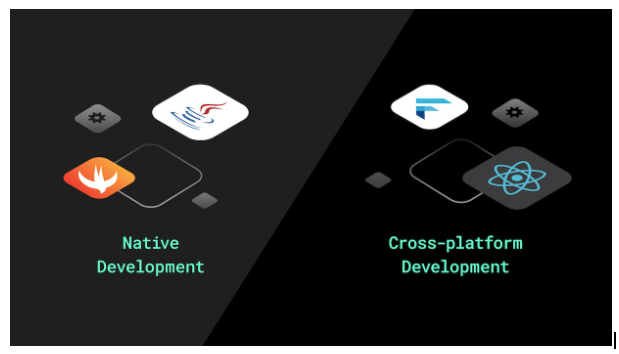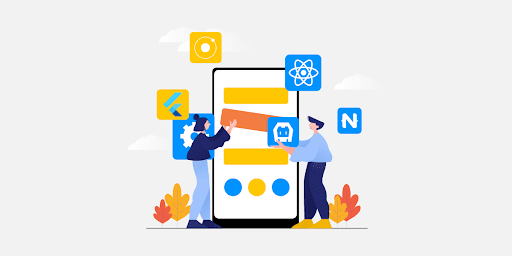With the advancements in technology, applications are becoming an increasingly important part of everyday life, from using social media applications to manage financial data or online shopping. With the growing importance of apps, companies have to make important decisions about what type of application to develop for their projects. Two of the most popular types of development are Native vs. Cross-Platform.

The number of mobile application downloads reached 255 billion in 2022, and this crazy number gives us the understanding of the application creation services on the market, as the number of the downloads is predicted to grow exponentially.
Native Application Development
Native application development refers to an application created specifically for use on a particular device, like a mobile operating system. Native applications are typically faster and more reliable, and provide access to the full range of weapons available on a given device such as the near-field communication (NFC) technology in Android-enabled devices or the Touch ID capability in iPhones and iPads.
One of the primary benefits of the first one in native vs. cross-platform app development is improved performance, speed and responsiveness, also they provide access to more sophisticated and specialized tools. For example, apps created specifically for Apple devices may be able to take advantage of a wider range of features and capabilities, such as AirPlay or FaceTime. Similarly, certain features or devices are only accessible through native sources, such as location-based services. This provides a unique opportunity to create an application that is tailored to provide a specific user experience.
Another benefit of native is the ability to provide a high degree of security. By being fully integrated into the underlying system, developers can leverage the built-in security features of the device, such as encryption and biometric authentication.

Benefits of Cross-Platform Development
What is cross-platform development – a type of software development that allows applications to be built or used on multiple computing systems. Nowadays, creation of software applications for devices with different operating systems has become a norm to companies investing heavily in cross-platform application development in order to increase their customer reach and remain competitive.
- One of the main benefits of cross-platform mobile app development is cost savings. By leveraging existing code, developers can save countless man-hours by not having to rewrite code, especially when dealing with similar operating systems such as Android and iOS. Moreover, developers can release their product on multiple platforms all at once, saving marketing and release costs as opposed to if they had released the application on individual operating systems separately.
- Another benefit of cross-platform application development is improved customer experience. Depending on the app, developing a cross-platform version ensures uniformity of design and look and feel, authenticity of user experience and uniform user interface across all the different backgrounds, yielding improved customer satisfaction and engagement. This is especially useful for businesses aiming to increase the visibility of their product and thinking about which one to choose in native vs. cross-platform app development.
- One more benefit of cross-platform development is that businesses can reach a wider customer base. Depending on the demographics of the target audience, businesses can craft their code to support both Android and iOS, in addition to other operating systems, enabling them to reach both novice and power users.
- When talking about native vs. cross-platform, the last one reduces the need to rewrite code and emphasizes reusing existing code and libraries, improving performance, creating fewer bugs and making the syncing process easier. It also allows developers to work on several areas simultaneously, saving time and eliminating the need to switch between different coding environments.
Mistakes To Avoid
In Native App Development
Lack of device and compatibility
There are different versions of devices available, as well as versions of operating systems, and developers must take all of these into account when creating a native application. Failure to test or code for all device and system versions can result in a broken application, or it may run differently on certain versions.
Neglecting user experience
It is important that developers create an application that is intuitive and easy to use. To make sure the user experience is positive, developers should perform usability testing to identify any problems in the interface, as well as test for navigation and performance. Additionally, it’s vital to ensure the application is visually appealing, so users will be drawn to it.

Forgetting to optimize for different OSs
This mistake tends to manifest in slow loading times, buggy features, and a lack of system compatibility. As such, it is important to make sure the application is coded and tested for the different systems, ensuring that it runs optimally and does not experience any performance issues.
In Cross-Platform App Development
Lack of proper testing
While testing is a key element of a cycle, it’s important to remember that different devices may require different kinds of tests. For example, a test for iOS may be different from a test for Android. Failing to properly test can lead to bugs, crashes and other issues that can impair the usability and user experience of the application.
Failing to take advantage of the platform-specific capabilities
For example, an iOS application might be able to use advanced features such as 3D Touch, whereas an Android one might lack the same capability. Not optimizing the application to make use of the unique capabilities of each platform can lead to a poor user experience.
Misunderstanding of language nuances
For instance, while Java is commonly used in Android apps, Swift is a preferred language choice for iOS. Failing to understand the differences between the two languages can lead to problems with the overall performance of the application.
Forgetting to consider the different UIs
Different platforms have different screen sizes, resolutions, and navigation frameworks. This means that apps often need to be customized for each platform in order to offer an optimal user experience. Failing to do so can lead to an inconsistent user experience across systems.
Conclusion
In conclusion, it is important for companies to decide which way is right for their projects. Native is best for companies looking for fast performance and access to all of the native platform features but is limited in terms of lifetime and target market. Cross-platform, on the other hand, is great for companies looking for a quick solution that reaches a larger audience.

It goes without saying that companies should invest into cross platform web application development, which would help to decide which type, native vs. cross-platform app development, is most suitable for their project and perform it well through the whole process.

